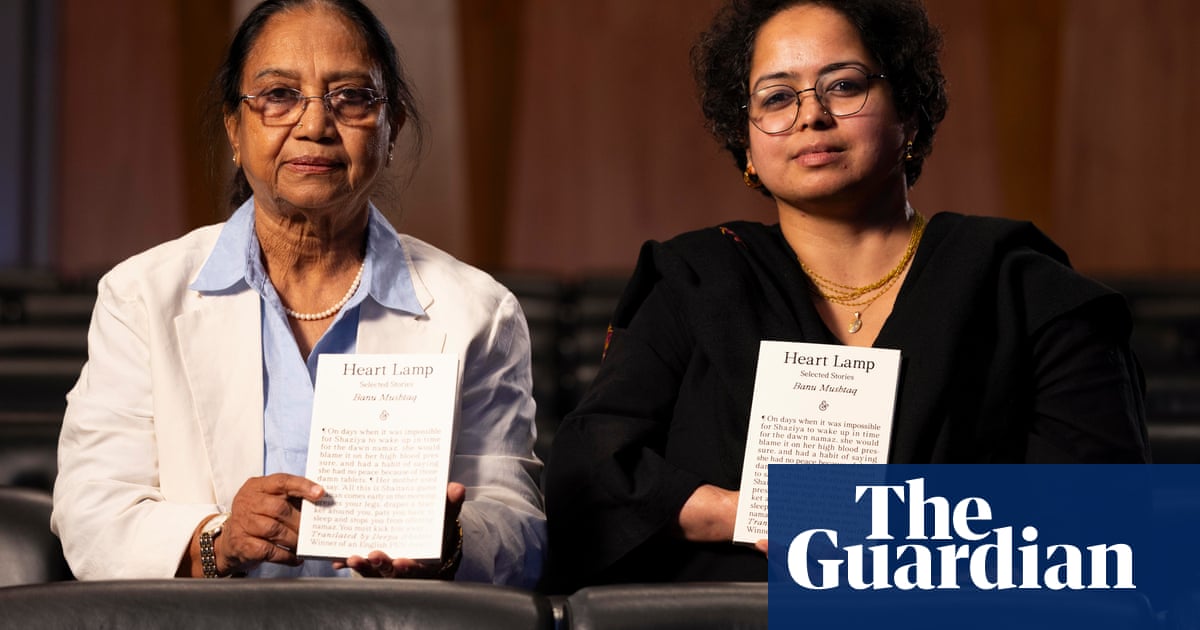Heart Lamp by Banu Mushtaq, translated by Deepa Bhasthi, has won this year’sInternational Booker prizefor translated fiction, becoming the first short story collection to take the award. The stories were originally written in Kannada, the official language of the state of Karnataka in southern India.
Described by the author and chair of judges Max Porter as “something genuinely new for English readers: a radical translation” of “beautiful, busy, life-affirming stories”, Heart Lamp’s 12 tales chronicle the lives of women in patriarchal communities in southernIndia. They were selected as well as translated by Bhasthi, the first Indian translator to win the award. She chose them from around 50 stories in six collections written by Mushtaq over a 30-year-period.
The £50,000 prize – shared equally between writer and translator – was presented at the Tate Modern in London on Tuesday evening, where a video of actorAmbika Modreading from the winning title was also shown.
Writing about the shortlist in the Guardian, John Self said Mushtaq and Bhasthi’s “wonderful collection” would be a “worthy winner”. The tone of the book “varies from quiet to comic, but the vision is consistent”, he wrote.
Porter said he and his fellow judges – poet Caleb Femi, writer and Guardian critic Sana Goyal, author and translator Anton Hur and musician Beth Orton – spent six hours deliberating, during which they “argued a lot” before “unanimously” deciding the winner.
Though Porter said they were looking for the “best book” above all else, he called Heart Lamp a “really special book in terms of its politics”. The stories “contain the feminism for which [Mushtaq] is known. And they contain extraordinary accounts of patriarchal systems and resistance,” he added. “But they aren’t activist stories. First and foremost they’re beautiful accounts of everyday life and particularly the lives of women.”
Porter also praised Bhasthi’s translation, which he said “celebrates the movement from one language to another. It contains a multiplicity of Englishes. It is a translation with a texture.”
Sign up toBookmarks
Discover new books and learn more about your favourite authors with our expert reviews, interviews and news stories. Literary delights delivered direct to you
after newsletter promotion
“When one translates, the aim is to introduce the reader to new words,” Bhasthi said in an interview withScroll.inearlier this year. “I call it translating with an accent, which reminds the reader that they are reading a work set in another culture, without exoticising it, of course. So the English in Heart Lamp is an English with a very deliberate Kannada hum to it.”
The other books shortlisted for the prize were On the Calculation of Volume I by Solvej Balle, translated by Barbara J Haveland; Small Boat by Vincent Delecroix, translated by Helen Stevenson; Under the Eye of the Big Bird by Hiromi Kawakami, translated by Asa Yoneda; Perfection by Vincenzo Latronico, translated by Sophie Hughes; and A Leopard-Skin Hat by Anne Serre, translated by Mark Hutchinson.
Last year’s winnerwas Kairos by Jenny Erpenbeck, translated by Michael Hofmann. Previous winners include Olga Tokarczuk and translator Jennifer Croft, Lucas Rijneveld and translator Michele Hutchison and Han Kang and translator Deborah Smith.
